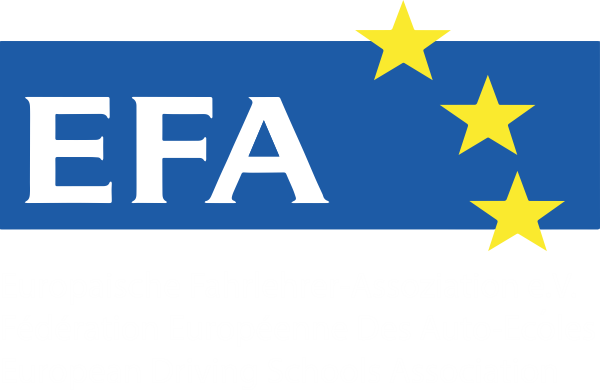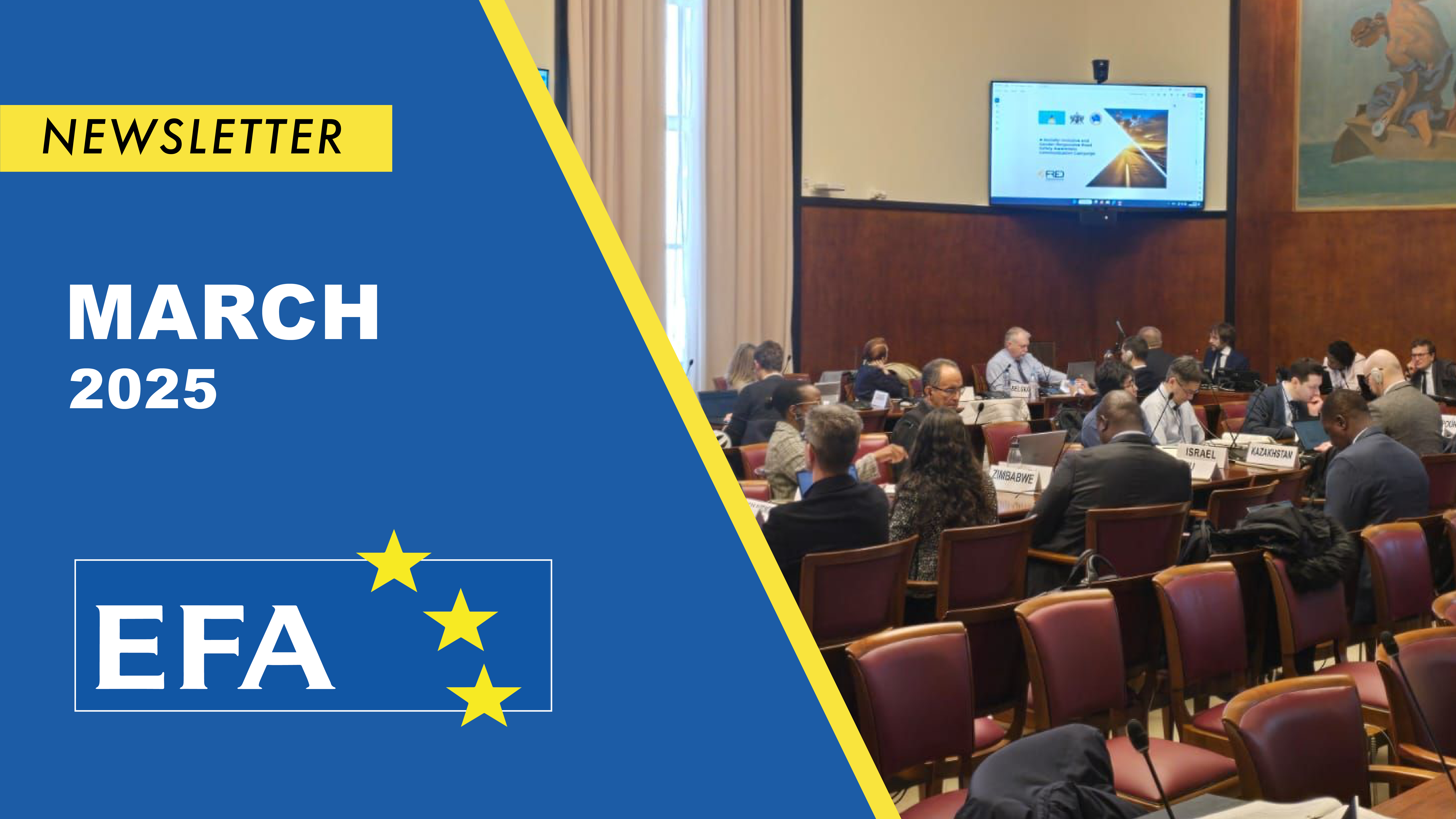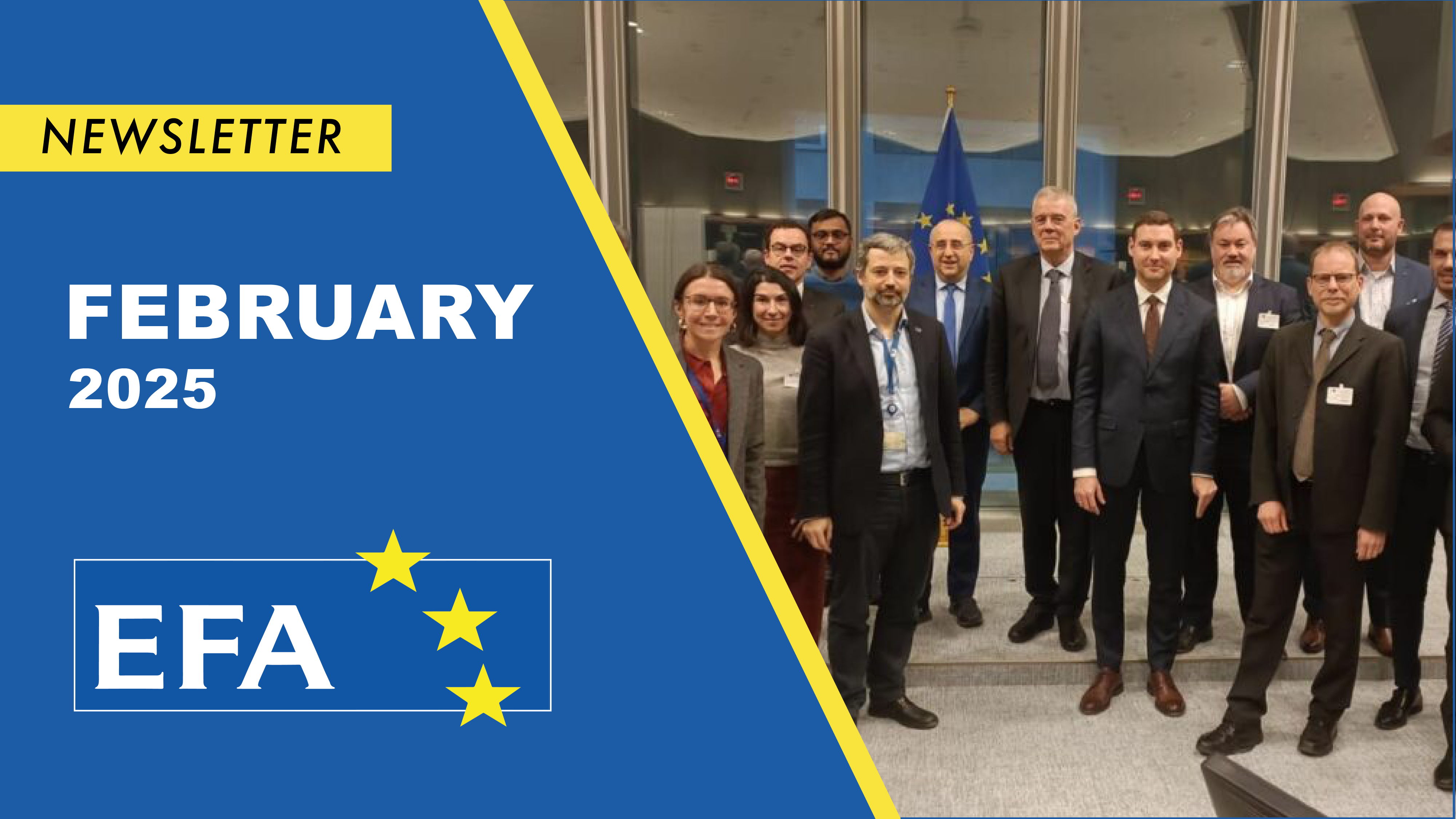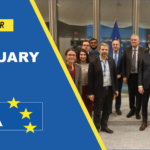Autokoululiitto entered in the board of the Finnish Road Safety Council
EFA congrats with Timo Suominen of Autokoululiitto who was elected to the board of Liikenneturva – The Finnish Road Safety Council for 2025-2026.

The Finnish Road Safety Council promotes safety on roads by influencing people’s behavior. It drives positive change in the values, attitudes and behaviours of all road users. Key functions include launching initiatives, encouraging change in public policies and legislation and guiding the road safety work of its member communities.
The council has 54 member organization’s and other members of the board include representatives from different government branches.
Decision making in the board is lead by Miko Bergbom a Finnish parliamentarian. Head of the board is usually connected closely to the Transport Minister.
The main focus of the board is making decisions about The Finnish Road Safety Councils work, but the board is also an important venue to discuss and influence Finnish Road Safety politics.
Below the comments from Timo Suominen: “In Finland, driving schools have been important cornerstones of traffic safety for almost 100 years. Many generations have been trained for all categories of driver’s licenses and we have been creating a common traffic culture. In that sense Finnish Driving School Association has naturally earned a place on the Finnish Road Safety Councils board.
FRSC has been an important partner of FDSA for years. A place on the FRSC board is a good opportunity to give support back. FDSA’s strength is, that through our work we have direct contact with both young and elderly people. We can pass on their thoughts and opinions to FRSC and thus possibly help to make their operations more efficient. Of course, the FRSC board position is also a great opportunity for the FDSA to highlight the current problems of driving schools and bring them to the attention of the political decision-makers”
FDSA’s representative on FRSC’s board is FDSA’s chairman Timo Suominen. His deputy is Caroline Stenström, who also belongs to the FDSA board.
ANIECA certified in ISO Standard
EFA Board is honored to inform you that ANIECA has been certificated in the Quality Management System by EIC – International Certification Company, accredited by IPAC, in accordance with NP EN ISO 9001:2015, a well-known international quality management standard.
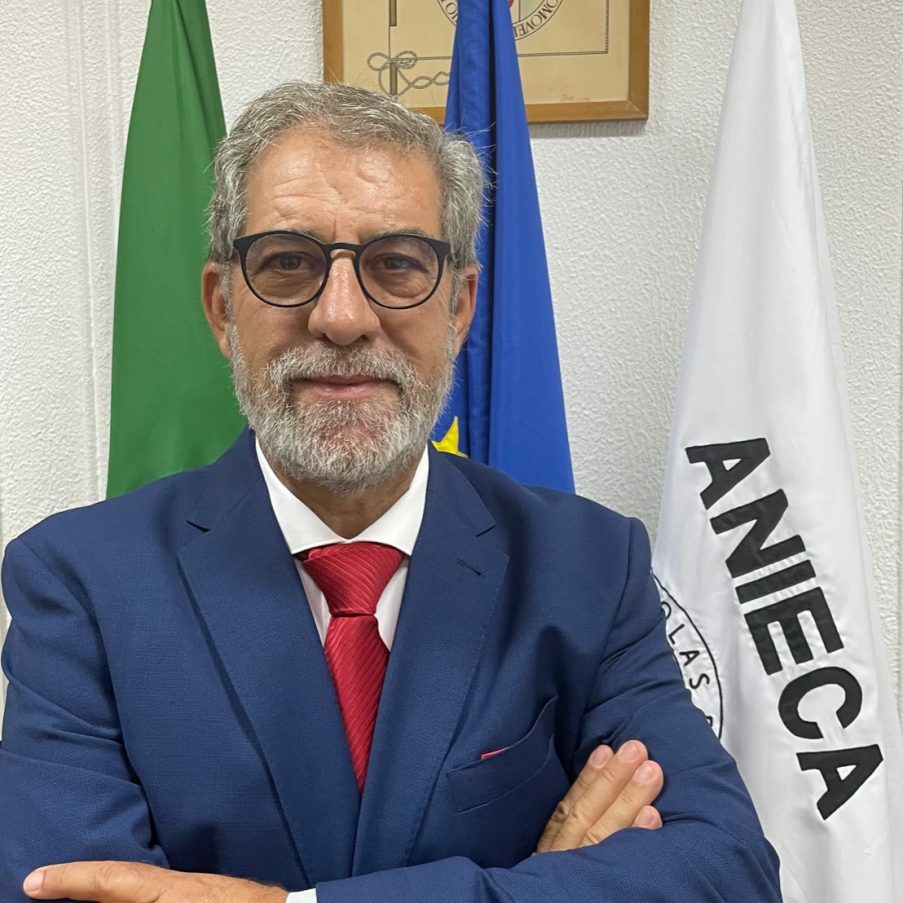
Antonio Reis
The ANIECA’s President Antonio Reis declares: “ISO 9001:2015 establishes strict criteria for quality management systems, and this certification recognises our ongoing commitment to offering high-quality services, as well as reinforcing the trust of our members, clients and the governmental and administrative organisations with which ANIECA interacts, reflecting our constant focus on operational efficiency and continuous improvement.
This milestone is a significant step in our journey of improvement, and one that sets us apart by ensuring that ANIECA operates in accordance with the standards of an internationally recognised quality management system, always searching for excellence in all processes and promoting the improvement of the performance of all the Association’s organic units.
Aware that we have begun a continuous process, we will continue to develop our activities with the aim of excellence and the satisfaction of our Members and all those who receive our services”.
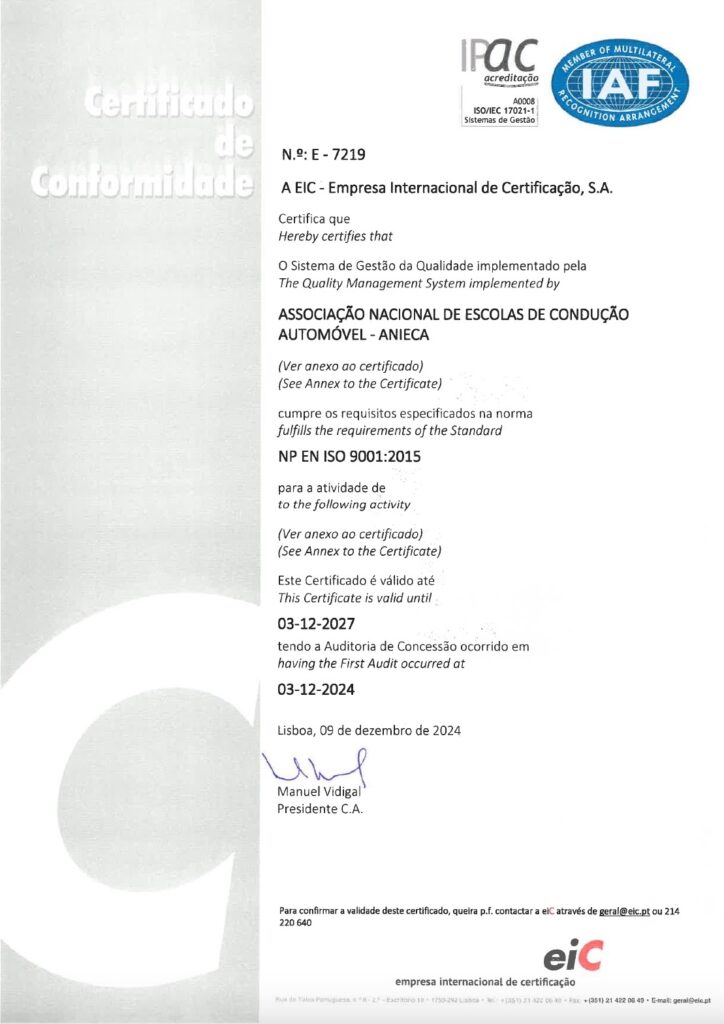
EFA takes part to the IRC event
The 30th anniversary of the Italian Resuscitation Council (IRC) took place in Bologna on December 13th. EFA was invited to participate and describe the ongoing collaboration between the associations of resucitations and that of driving schools.
IRC is the Italian member of the European Council of Resuscitation Physicians (ERC) with which EFA has established a collaboration since 2022 for the project “Learn to Drive, Learn CPR”.
The IRC President, Dr Andrea Scapigliati, invited the Secretary General of EFA, Mr. Manuel Picardi, to describe the first activities delivered by the Italian driving schools. Mr. Picardi outlined the project: “Our common goal is to create a network of lay trainers based on the training skills of driving instructors, who can train millions of young people who want to get a driving licence every year. We estimate that every year in Europe about 15 million people get a driving licence. Let’s just imagine being able to actually train 1%, or at least explain to them how to intervene to reduce the damages of an emergency situation. Many lives could be saved, even those not directly connected to road accidents”. Picardi continued: “In Italy we have already organized 3 courses: in Milan, in Rome and in Bari. In 2025 we plan to organize others and start with the second level courses, to enable driving instructors to organize BLSD courses directly in driving schools”.
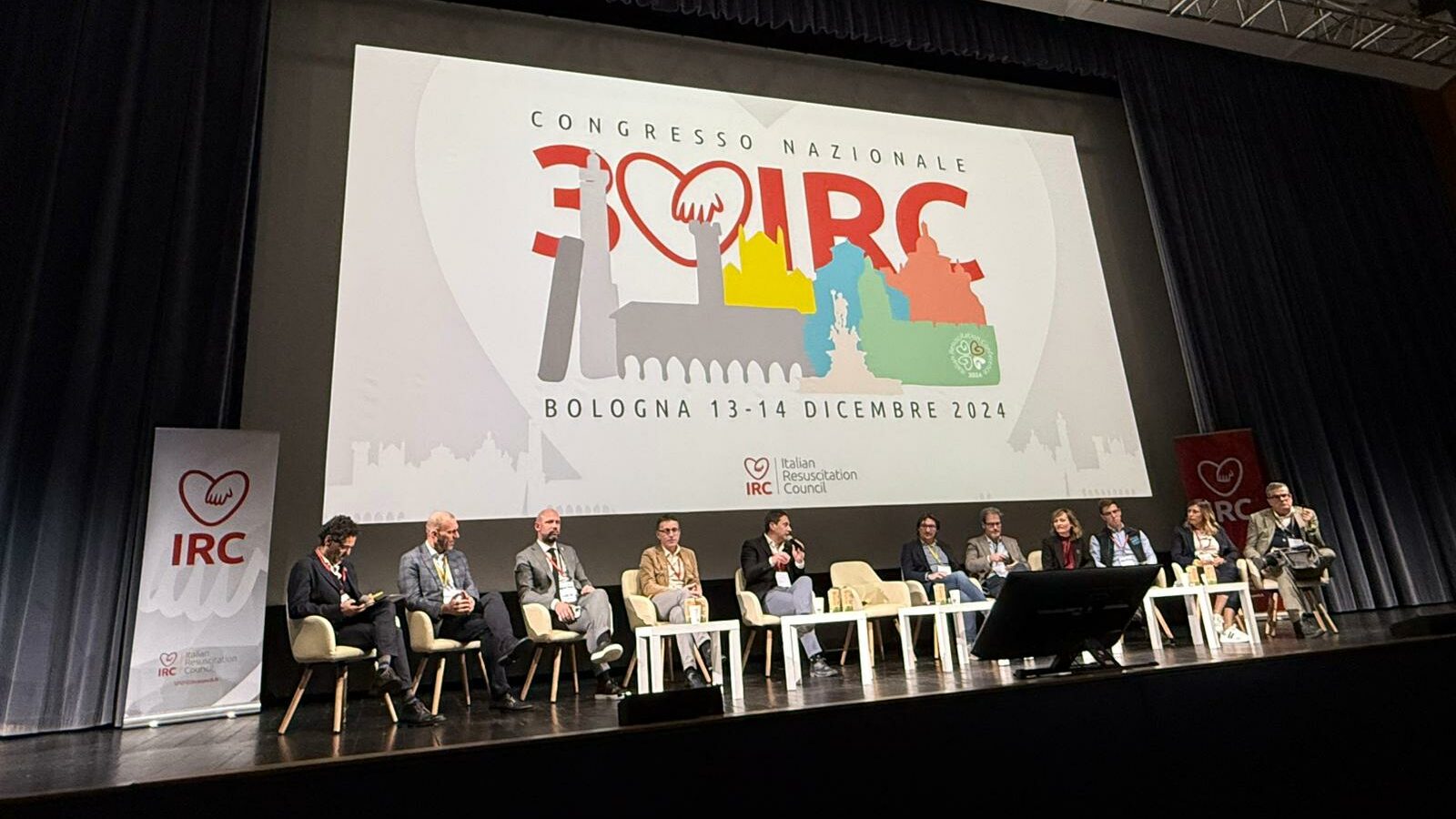
Austrian driving schools want to combat cheating in theory tests

The Austrian driving school owners met at their annual ‘Fahrschultagung’ to discuss current challenges. Gang-related cheating in theory tests is both an Austrian and a European phenomenon. During theory tests, candidates are technically equipped with a camera and a hearing aid (button) in their ear or a vibrating device somewhere on their body. Using an internet connection via mobile phone or router, the candidates receive a signal when the mouse pointer is on the correct answer. Read the full text.
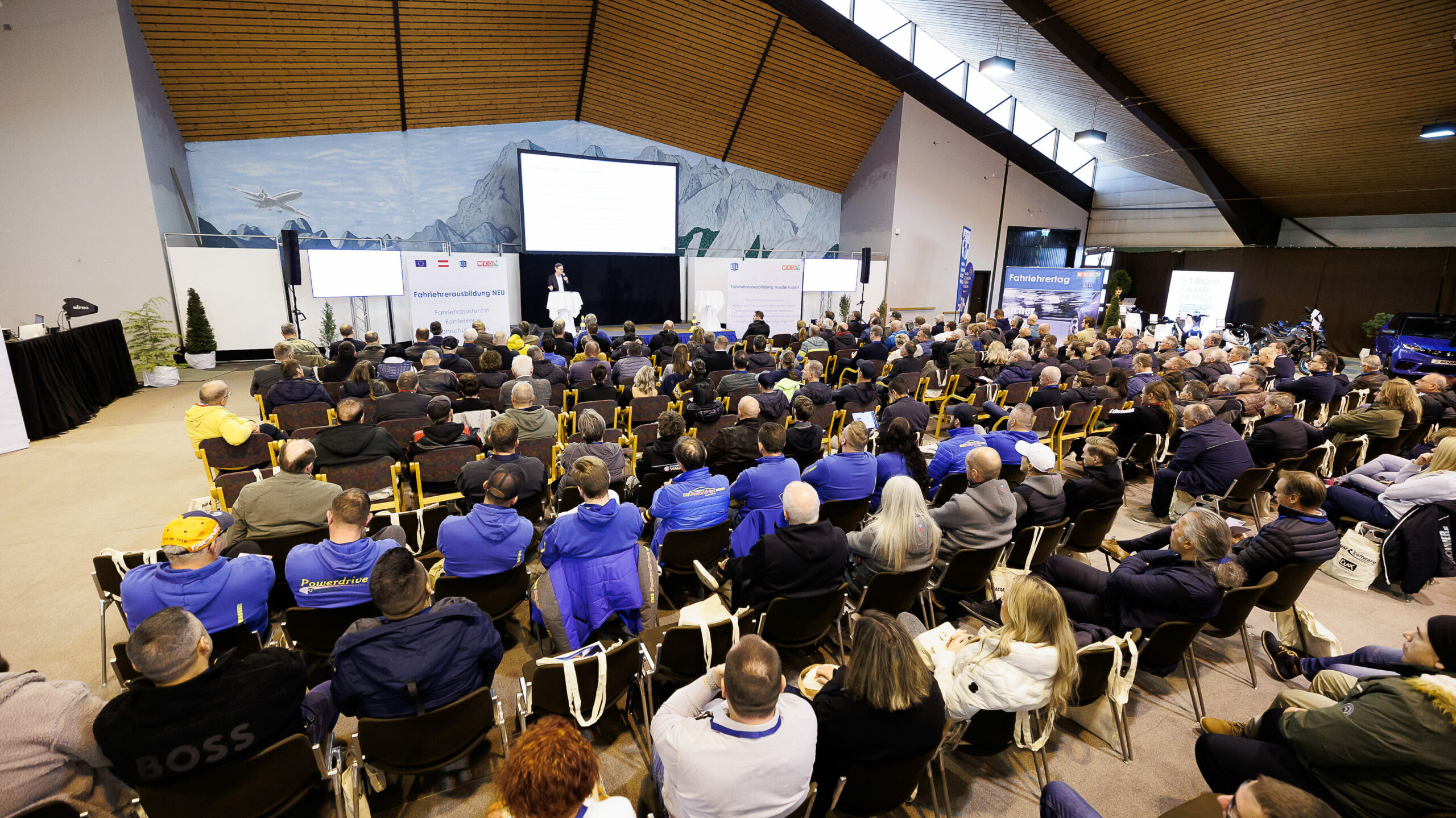
CNAE AVILA CONVENTION 2024
Two essential issues for driving schools: the shortage of personnel in traffic headquarters and the necessary road awareness to reduce road accidents.
The experts highlighted, once again, the importance of implementing mandatory training in the theoretical, through road awareness modules, such as those established in the courses of the “permiso por puntos”.
In the first, Ignacio Lijarcio, vice-president of Fesvial, Mar Cogollos, director of AESLEME, and Jesús Monclús, director of the Prevention and Road Safety Area of Fundación MAPFRE, spoke about the importance of road awareness to save lives, highlighting the relevance of face-to-face training through road awareness modules taught in driving schools.
In the second of the tables, Enrique Lorca, president of CNAE; Ramón Lamiel, director of the Catalan Traffic Service (SCT), Estibaliz Olabarri, director of Traffic of the Basque Government (Trafikoa) and José Javier Boulandier, director of Traffic of the Government of Navarre, discussed the role of public administrations in reducing road accidents.
They shared their experiences, with special emphasis on the necessary collaboration between public administrations and the private sector to improve safety on our roads.
The modification of the General Traffic Regulations, in terms of protection of vulnerable users, was one of the issues that were discussed. In this sense, the importance of training for pedestrians, cycle drivers and PMVs was highlighted.
The implementation of awareness and sensitization modules at the time of accessing the driving license as an effective measure to reduce road accidents was also discussed at this table.
Granada will organize the 54th CNAE Convention, in which we hope to be able to bring together the driving school sector again.
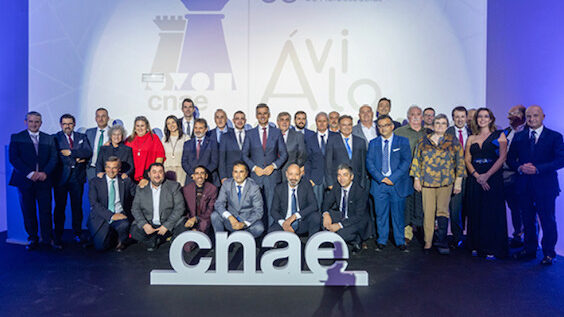

Italian National Event
On the 25th of November, Naples hosted the National Driving Schools Council organized by Unasca, an important event that recorded a significant participation despite the difficulties caused by the national transport strike. The event represented a fundamental opportunity to draw up a balance of the first year of the mandate of the National Secretary of Unasca Driving Schools, Mr. Alfredo Boenzi.
Among the most significant moments of the event, one it was the remotely participation of the Minister of infrastructure and Transport, Mr. Matteo Salvini.
Mr. Salvini underlined the importance of an open and constructive dialogue on key issues such as the updating of the Hi way Code, inviting the association to provide concrete contributions (“We expect suggestions and advice from Unasca”).
Mr. Boenzi highlighted how his work was inspired by a principle of continuity with his predecessor’s strategy, Mr. Emilio Patella. This approach has strengthened the direct relationship between Unasca and the Ministry of Infrastructure and Transport, consolidating the role of the association not only as a partner in defining the rules, but also in the design of policies for road safety and driver training.
Mr. Boenzi thanked the participant members, for their work and concrete contribution to achieving the objectives set: “The success of Unasca is the result of teamwork, and the contribution of each of you has been fundamental”. He also reiterated the importance of constant dialogue and effective coordination between the various levels of the association, essential elements for addressing the challenges of a constantly evolving sector. Looking to the future, Mr. Boenzi emphasized some priorities for the coming year, including updating training methodologies, adapting to new mobility technologies and strengthening the culture of road safety. The Secretary underlined the need to make driving schools protagonists of their transition towards sustainable and inclusive mobility.
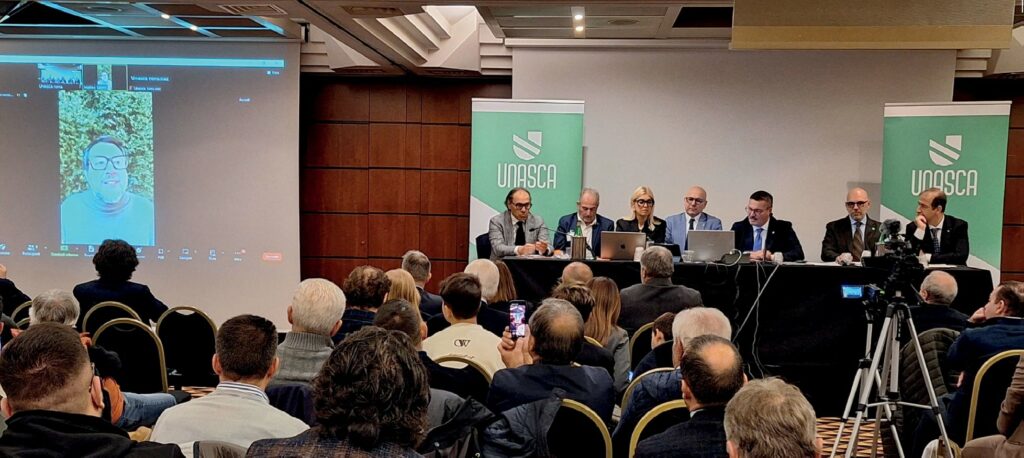
Measuring New Mobility: Case Studies and Best Practices

In many cities, new mobility services have become a small yet important component of urban passenger transport systems. Local authorities must be able to measure these services to understand their benefits, monitor negative impacts and guide policy interventions.
This report helps policy makers implement new mobility measurement and monitoring frameworks. It draws on lessons from ten case studies around the world to offer practical recommendations for effective data reporting and monitoring frameworks.
Read the Report
ERSA publication on Young and Aging Drivers
The **Young and Aging Drivers Thematic Report** from the European Survey of Road Users’ Safety Attitudes (ESRA) has been released, offering comprehensive data on road safety across 39 countries worldwide, based on the ESRA3 survey. This thematic report provides insights into self-reported behaviors and the perceived social and personal acceptability of driving under the influence, speeding, and distracted driving among young and aging drivers.
Key findings indicate that aging drivers (65-74) are less likely than younger drivers to engage in risky behaviors such as impaired driving, speeding, or distracted driving, including using hand-held phones or reading messages.

RTR Conference 2025 from 11th to 13th February 2025 – Brussels
The Organising Team (2Zero – ERTRAC – CCAM – BEPA – European Commission) want to remind you to secure your spot at the #RTR2025 Conference. Taking place from 11th to 13th February 2025, at the EGG Brussels, this event will showcase groundbreaking results from 92 funded research projects, offering insights into the future of road transport.
Why Attend?
- Engage in high-level technical presentations and lively discussions with leading stakeholders in European road transport R&I.
- Discover the latest advancements from EU-funded research projects related to road transport: green vehicles, road safety, autonomous mobility, batteries, urban mobility …and more!
- Network with over +450 onsite attendees.

Download the Draft Programme:
Registration is free, but seats are limited – sign up now to secure your participation!
Please register here:
https://rtrconference.us18.list-manage.com/subscribe?u=d41526073b8e7be4f5f5d9d23&id=e1b73a1356

